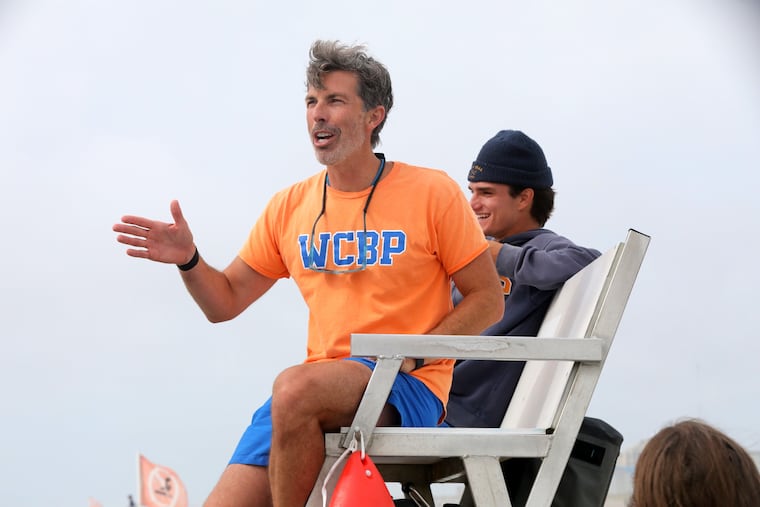This Drexel business professor spent the summer studying lifeguards by being one
Robert Morier is out to prove that lifeguarding can teach lifelong leadership and communication skills and glow up a young professional’s resumé more than typical summer jobs, like scooping ice cream.

WILDWOOD CREST — The office was overcast Saturday morning, the wind pushing dark tides over a mostly empty beach, when Robert Morier emerged from the waves in a wetsuit, on his way to work.
Morier, a 46-year-old professor at Drexel University’s Close School of Entrepreneurship, changed into a bathing suit and T-shirt, grabbed a jug of water, and pushed a metal lifeguard stand toward the surf. At 10 a.m., he climbed to his seat and scanned the turbulent Atlantic, one last weekend of research to prove that lifeguarding can teach lifelong leadership and communication skills and glow up a young professional’s resumé more than scooping ice cream on the boardwalk.
“There is no other job you can get at 16 that gives you this much responsibility and forces you to communicate with adults like lifeguarding,” Morier said. “I think more students should become lifeguards instead of focusing on getting traditional internships in high school. Lifeguarding offers a more dynamic environment that cultivates leadership versus being behind a desk.”
Morier, who grew up in Wildwood Crest and lifeguarded there decades ago, returned this summer for hands-on research on how the beach patrol there “fosters innovation and leadership.”
“You know, I had a very successful career in finance and there’s lifeguards who’ve become orthopedic surgeons and generals,” he said. “Hopefully, I’ll be in academia for a long time and can follow some of these 16-year-olds this year and follow them for decades to see how they develop.”
Jonathan Feraco, Morier’s partner in the stand on this particular Saturday, is a 24-year-old financial planner and the eighth member of his family to be a lifeguard at the Jersey Shore.
“When I was 16, I wanted to make money more than anything. That’s all that I cared about,” he said. “My dad filled out the application for me and basically said ‘just go take the test, that’s all that you need.’ I cried the last day of the year because I loved it. This has taught me more than I will ever, ever know ever.”
Morier plans to write up his findings this winter and submit his work to academic journals. But he’s an actual guard, too, two days a week, with Drexel’s blessing.
“I told him if he can pass the fitness test, he can come back,” said Bud Johnson, 76, Wildwood Crest’s longtime beach patrol chief.
Morier invited Johnson to his classroom last year to discuss organizational strategy and leadership, which sparked the larger idea for his research project. In June, he presented a paper titled “Adapting to the Tide: Entrepreneurial Innovation in Ocean Lifeguarding Amidst Environmental and Societal Shifts” at a business conference in Maryland.
Lifeguarding was always serious business on the beach, but you also counted getting a tan and, possibly, a date, as some of the side benefits. Today, Morier said, the responsibility is far greater. Lifeguards are not allowed to be on phones — ever — or even read a book over their long shifts. While talking to the public is part of the job and, Morier believes, part of what helps develop business skills, Johnson said his guards have a five-minute window to end the conversation.
“And they never, ever take their eyes off the water,” Johnson said.
Part of Morier’s study will focus on the challenges of hiring and keeping lifeguards. There’s been a well-documented lifeguard shortage nationwide, both at the beaches and public pools. Beach patrol captains have told The Inquirer young workers wanted jobs with “less risk and higher pay.” Morier said it’s difficult for teens whose parents don’t own or rent homes in the Wildwoods to find an affordable place to live for the summer, and Johnson said some young athletes, the kind of person who’d want to be a lifeguard, have sports commitments through the summer.
One way the Wildwood Crest Beach Patrol has tried to fill the ranks, Morier said, is through its Futures and Junior Lifeguard programs for children who are 13 to 15. He likened beach patrol to a successful business or sports program.
“UCLA basketball comes to mind,” he said.
When Morier, who lives in Fairmount, graduated from the University of Vermont and went looking for jobs in the finance world in New York City, he described lifeguarding as “open water technician” on his resumé, but said the experience they gain — risk management, decision-making, punctuality, mental and physical health — stand for themselves.
“The skills you get on this job are difficult to replicate,” he said.
On this Saturday, no one was swimming and that likely wouldn’t change but there were plenty of surfers. They rarely have trouble, Morier said, but if anything happened, he said Feraco would probably leap off the stand first.
“I’ll come down easy,” he said. “If I did that, I’d probably tear my Achilles.”